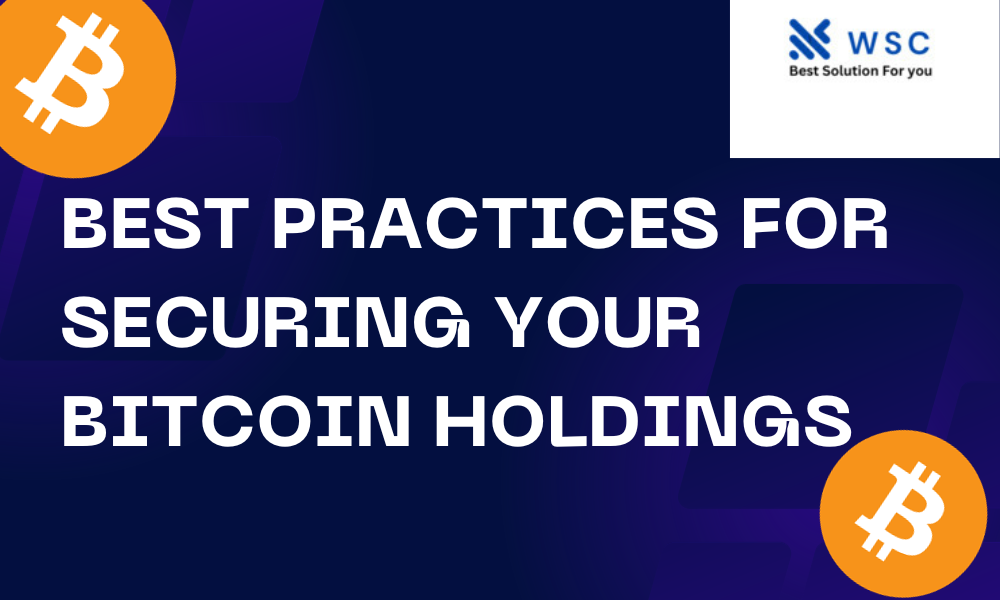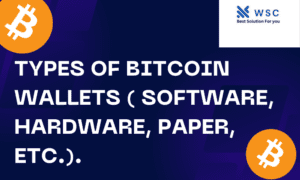Introduction: Understanding Bitcoin Security
In the fast-evolving landscape of cryptocurrency, securing your Bitcoin holdings is paramount. The decentralized and digital nature of Bitcoin demands a proactive approach to safeguard against potential threats. This guide offers comprehensive insights and actionable best practices to fortify your Bitcoin security.
Understanding the Importance of Secure Practices
Security in the realm of Bitcoin transcends mere protection—it’s about preserving financial autonomy. The decentralization that defines Bitcoin also places the responsibility squarely on individuals to ensure their holdings remain impervious to cyber threats.
Creating a Strong Foundation:
Secure Wallets The cornerstone of Bitcoin security rests in choosing the right wallet. Hardware wallets offer unparalleled security, segregating keys from internet-connected devices. Software wallets, though convenient, demand robust security measures like encryption and regular backups.
Multi-factor Authentication:
Strengthening Access Implementing multi-factor authentication adds layers of defense. Combining something you know (password) with something you have (authentication app/hardware key) exponentially raises the difficulty for potential intruders.
Backup Strategies:
Ensuring Redundancy Data loss can be catastrophic. Regularly backing up your wallet and storing these backups securely is vital. Employing offline or cold storage for backups minimizes vulnerability to online threats.
Regular Software Updates:
Vital Security Patches Software vulnerabilities are prime targets for attackers. Regularly updating your wallet and devices ensures you benefit from the latest security patches, thwarting potential exploits.
Offline Storage and Cold Wallets
Cold storage, disconnected from the internet, provides an impregnable shield against online threats. Utilizing hardware wallets or paper wallets for long-term storage keeps your assets offline and secure.
Secure Networks and VPNs
When accessing your Bitcoin accounts, ensure you’re on a secure network. VPNs (Virtual Private Networks) encrypt your connection, adding an extra layer of security against potential eavesdropping or data interception.
Phishing Awareness and Prevention
Phishing attempts are common in the digital space. Verifying the legitimacy of websites, emails, or messages before sharing any sensitive information is crucial in protecting your assets.
Importance of Secure Passwords
Creating complex, unique passwords for each account reduces the risk of unauthorized access. Password managers aid in generating and securely storing these intricate passwords.
Using Hardware Security Keys
Hardware security keys, like YubiKeys, provide robust protection against unauthorized access. Their physical nature makes them resilient to remote hacking attempts.
Limiting Exposure:
Privacy and Anonymity Maintaining privacy and anonymity shields your holdings from prying eyes. Employing tactics like using pseudonymous addresses and avoiding disclosing transaction details enhances security.
Security Measures for Mobile Devices
Securing mobile devices with robust passcodes, encryption, and anti-malware apps prevents potential breaches through compromised devices.
Safe Practices in Public Wi-Fi
Public Wi-Fi networks pose significant security risks. Avoiding financial transactions or accessing Bitcoin-related accounts on such networks mitigates potential threats.
Security Audits and Monitoring
Regularly auditing your security measures and monitoring your accounts for any suspicious activities enable swift action against potential breaches.
Recovery Protocols in Case of Breach
Preparing contingency plans and understanding the steps to recover in case of a security breach is crucial for minimizing potential losses.
Avoiding Social Engineering Attacks
Being vigilant against social engineering tactics, like impersonation or coercion, ensures that attackers can’t manipulate you into compromising your security.
Smart Contract Security Measures
Involvement in smart contracts demands a deep understanding of their functioning. Prioritizing verified contracts and thoroughly vetting code helps avoid vulnerabilities.
Escrow Services: Ensuring Transactions
Utilizing reputable escrow services for transactions adds a layer of security, ensuring fairness and trust in dealings.
Importance of Verified Sources
Relying on vetted sources and reputable platforms for information and transactions reduces the risk of falling victim to scams or misinformation.
Understanding Blockchain Confirmations
Understanding the significance of confirmations on the blockchain aids in gauging transaction security and reliability.
Security in Decentralized Finance (DeFi)
Participating in DeFi requires a robust understanding of associated risks. Employing secure platforms and cautious lending practices mitigate potential threats.
Secure Trading and Exchanges
Choosing reputable and secure exchanges, employing strategies like two-factor authentication, and staying informed about exchange security protocols ensures safe trading practices.
Tax Implications and Security
Understanding tax implications related to Bitcoin holdings ensures compliance and security in legal matters.
Continual Learning and Staying Updated
The landscape of Bitcoin security is dynamic. Continual learning, staying updated with the latest trends, and adapting security practices accordingly are imperative.
Check our tools website Word count
Check our tools website check More tutorial




